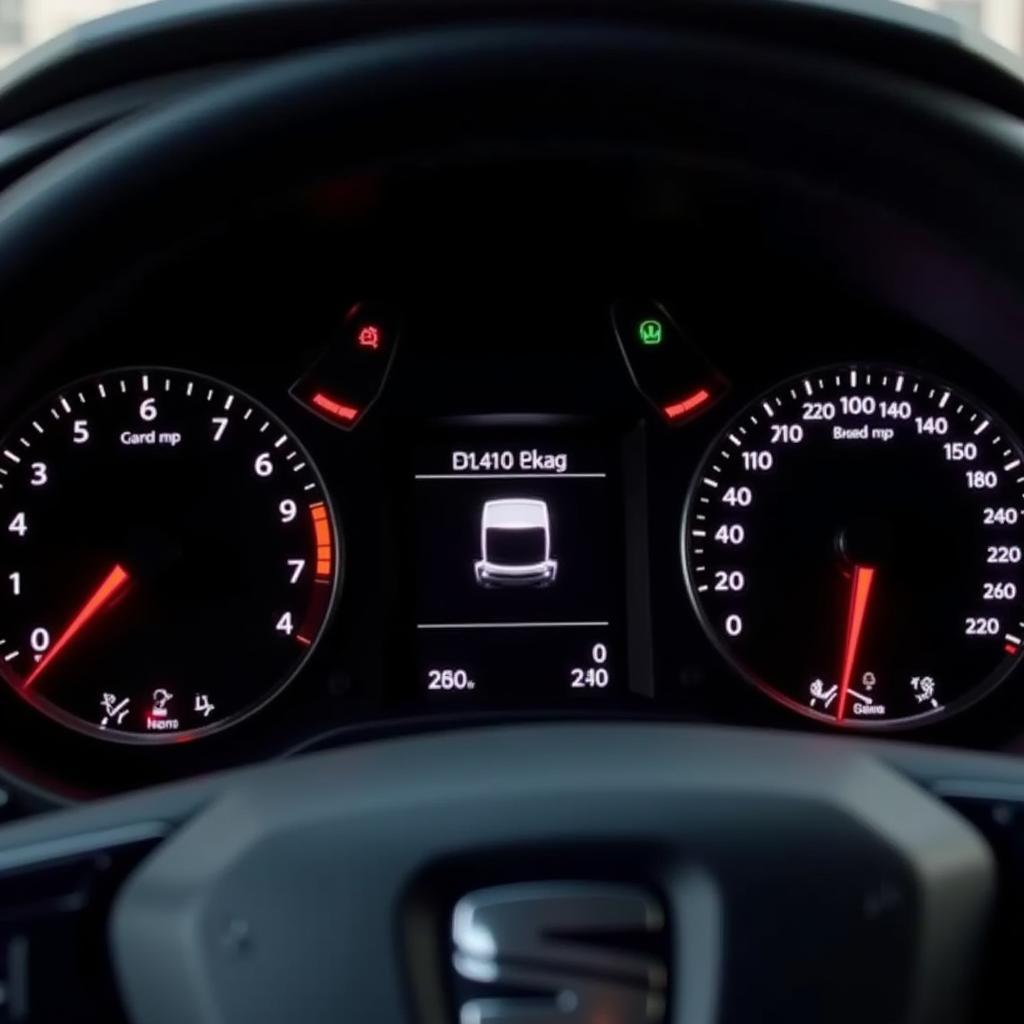The brake warning light on your Audi A4 2000 is a crucial safety feature, illuminating on the dashboard to signal potential issues within the braking system. Ignoring this warning could lead to reduced braking performance and increase the risk of accidents. This comprehensive guide will delve into the common causes of an illuminated brake warning light on your Audi A4 2000, provide potential solutions, and offer insights into remote diagnostic options for convenient and effective troubleshooting.
Understanding Your Audi A4 2000 Brake Warning Light
The brake warning light, typically depicted as a red circle with an exclamation mark or the word “BRAKE” inscribed, can indicate several issues, ranging from minor to serious. While a lit brake warning light doesn’t always signify an immediate emergency, it’s crucial to address the underlying problem promptly.
Common Causes of an Illuminated Brake Warning Light
Several factors can trigger the brake warning light on your Audi A4 2000. Here are some of the most prevalent causes:
-
Low Brake Fluid Level: The most common culprit is often a low brake fluid level. This usually indicates a leak in the braking system, which needs immediate attention.
-
Worn Brake Pads: Brake pads have wear indicators that trigger the warning light when they wear down to a certain level. Timely replacement of worn brake pads is vital for optimal braking performance.
-
Faulty Brake Light Switch: A malfunctioning brake light switch can cause the brake lights to stay on constantly or not illuminate at all, also triggering the warning light.
-
ABS System Malfunction: The Anti-lock Braking System (ABS) helps prevent wheel lockup during braking. If the ABS system encounters issues, the warning light will illuminate.
-
Parking Brake Engaged: While seemingly obvious, sometimes the parking brake might be slightly engaged, causing the light to stay on.
Troubleshooting the Brake Warning Light
Before heading to a mechanic, you can perform some basic checks:
-
Check the Brake Fluid Level: Open the hood and locate the brake fluid reservoir. Check the fluid level, ensuring it falls between the minimum and maximum markings. If the level is low, there might be a leak.
-
Inspect the Brake Pads: Visually inspect the brake pads through the wheel spokes. If they appear excessively thin or you notice metal scraping against metal, it’s time for a replacement.
-
Check the Parking Brake: Ensure the parking brake is fully disengaged. Sometimes, even a slight engagement can trigger the warning light.
Remote Diagnostics: A Convenient Solution
Modern technology allows for remote diagnostics of your Audi A4 2000, offering a convenient initial assessment.
“Remote diagnostics can pinpoint the root cause of the brake warning light in many cases,” says Emily Carter, Senior Automotive Engineer at RemoteAuto Solutions. “This saves valuable time and money by avoiding unnecessary trips to the mechanic.”
By connecting your vehicle to a specialized diagnostic tool, skilled technicians can remotely analyze the car’s computer system, identify fault codes, and often provide an accurate diagnosis of the issue.
When to Seek Professional Help
While some issues can be addressed with basic troubleshooting, seeking professional help is recommended if:
- The brake warning light remains illuminated after checking fluid levels and brake pad wear.
- You suspect a brake fluid leak.
- The brake pedal feels spongy or goes all the way to the floor.
- You hear unusual noises while braking.
Conclusion
Addressing the brake warning light on your Audi A4 2000 is paramount for your safety and the optimal performance of your vehicle. While simple checks can help identify minor issues, don’t hesitate to seek professional assistance for a comprehensive diagnosis and repair. Remember, maintaining a well-functioning braking system is crucial for a safe and enjoyable driving experience.
FAQs
1. Can I drive my Audi A4 2000 with the brake warning light on?
While it’s not recommended, you might be able to drive a short distance with the brake warning light on, depending on the underlying cause. However, it’s crucial to identify and address the issue promptly to avoid potential hazards.
2. How much does it cost to fix a brake warning light on an Audi A4 2000?
The repair cost varies depending on the underlying problem. A simple brake fluid top-up might cost only a few dollars, while replacing major components like the ABS module can cost significantly more.
3. How often should I change my brake fluid?
It’s generally recommended to change your brake fluid every 2 years or 24,000 miles, whichever comes first. However, consult your owner’s manual for specific recommendations for your Audi A4 2000.
4. Can I add any brake fluid to my Audi A4 2000?
No, you should only use the brake fluid type recommended in your owner’s manual. Using the wrong type of brake fluid can damage your braking system.
5. How long does it take to replace brake pads?
Replacing brake pads typically takes an hour or two, depending on the mechanic’s workload and the complexity of the job.

